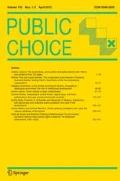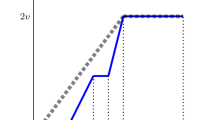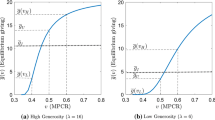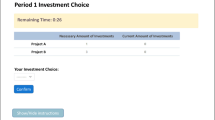Abstract
Interest groups pay monetary contributions to gain access and provide information to a policymaker. If their interests are aligned with those of the policymaker's constituency, they have costless access and report their private information truthfully. If their interests conflict, they are forced to pay a strictly positive contribution in order to enhance the credibility of their reports. The policymaker bases her policy decision on the competing reports and the size of the contributions accompanying these reports. The interest groups' contribution decisions are plagued by a free rider problem. I derive the implications of this problem for the size and pattern of contributions and for the degree of information aggregation.
Similar content being viewed by others
References
Austen-Smith, D. (1990). Information transmission in debate.American Journal of Political Science 34: 124–152.
Austen-Smith, D. (1993). An access model of campaign contributions. Mimeo. University of Rochester. March.
Austen-Smith, D. and Wright, J.R. (1991). Competitive lobbying for legislators' votes. Mimeo. University of Rochester. January.
Ball, R. (1993). Political lobbying as welfare improving signaling. Mimeo. Haverford College. March.
Baron, D.P. (1991). Spatial electoral competition and campaign contributions with informed and uninformed voters. Graduate School of Business Research Paper No. 1174. Stanford University. November.
Becker, G.S. (1983). A theory of competition among pressure groups for political influence.Quarterly Journal of Economics 98: 371–400.
Birnbaum, J.H. (1992).The lobbyists: How influence peddlers get their way in Washington. New York: Times Books.
Feddersen, T.J. and Pesendorfer, W. (1993). The swing voter's curse. Mimeo. Northwestern University. October.
Heitshusen, V. (1993). Strategic lobbying by interest groups: The role of information and institutional change. Mimeo. Paper presented at the Midwest Political Science Association Meetings in Chicago. April.
Kreps, D.M. and Wilson, R. (1982). Sequential equilibria.Econometrica 50: 863–893.
Krueger, A.O. (1974). The political economy of the rent-seeking society.American Economic Review 64: 291–303.
Lohmann, S. (1993a). A signaling model of competitive political pressures. University of California at Los Angeles. Revised December.
Lohmann, S. (1993b). A signaling model of informative and manipulative political action.American Political Science Review 87: 319–333.
Lohmann, S. (1993c). A welfare analysis of political action. In William Barnett et al. (Eds.),Political economy: Institutions, information, competition and representation, 437–461. Cambridge: Cambridge University Press.
Lohmann, S. (1994). Information aggregation through costly political action.American Economic Review 84: 518–530.
Magee, S., Brock, W. and Young, L. (1989).Black hole tariffs and endogenous policy theory. New York: Cambridge University Press.
McCarty, N. and Rothenberg, L. (1993). The strategic decisions of political action committees. Mimeo. University of Southern California and University of Rochester. September.
Morton, R. and Cameron, C. (1992). Elections and the theory of campaign contributions: A survey and critical analysis.Economics and Politics 4: 79–108.
Nelson, D. (1988). Endogeneous tariff theory: A critical survey.American Journal of Political Science 32: 796–837.
Olson, M. (1965).The logic of collective action. Cambridge: Harvard University Press.
Potters, J. and van Winden, F. (1992). Lobbying and asymmetric information.Public Choice 74: 269–292.
Rasmusen, E. (1993). Lobbying when the decisionmaker can acquire independent information.Public Choice 77: 899–913.
Rasmusen, E. and Ramseyer, J.M. (1994). Trivial bribes and the corruption ban: A coordination game among rational legislators.Public Choice 78: 305–327.
Riezman, R. and Wilson, J.D. (1992). Politics and trade policy. Mimeo. University of Iowa and Indiana University. November.
Selten, R. (1975). Reexamination of the perfectness concept for equilibrium points in extensive games.International Journal of Game Theory 4: 25–55.
Smith, H. (1988).The power game: How Washington works. New York: Random House.
Snyder, J.M. (1990). Campaign contributions as investments: The U.S. House of Representatives, 1980–1986.Journal of Political Economy 98: 1195–1227.
Snyder, J.M. (1991). On buying legislatures.Economics and Politics 3: 93–109.
Snyder, J.M. (1993). The market for campaign contributions: Evidence for the U.S. Senate 1980–1986.Economics and Politics 5: 219–240.
Spence, M. (1973). Job market signaling.Quarterly Journal of Economics 87: 359–374.
Tullock, G. (1967). The welfare costs of tariffs, monopolies, and theft.Western Economic Journal 5: 224–232.
Tullock, G. (1980). Efficient rent-seeking. In J.M. Buchanan, R.D. Tollison and G. Tullock (Eds.),Toward a theory of the rent-seeking society, 97–112. College Station: Texas A&M University Press.
Author information
Authors and Affiliations
Additional information
I would like to thank David Austen-Smith, Nolan McCarty and an anonymous referee for insightful comments.
Rights and permissions
About this article
Cite this article
Lohmann, S. Information, access, and contributions: A signaling model of lobbying. Public Choice 85, 267–284 (1995). https://doi.org/10.1007/BF01048199
Accepted:
Issue Date:
DOI: https://doi.org/10.1007/BF01048199




